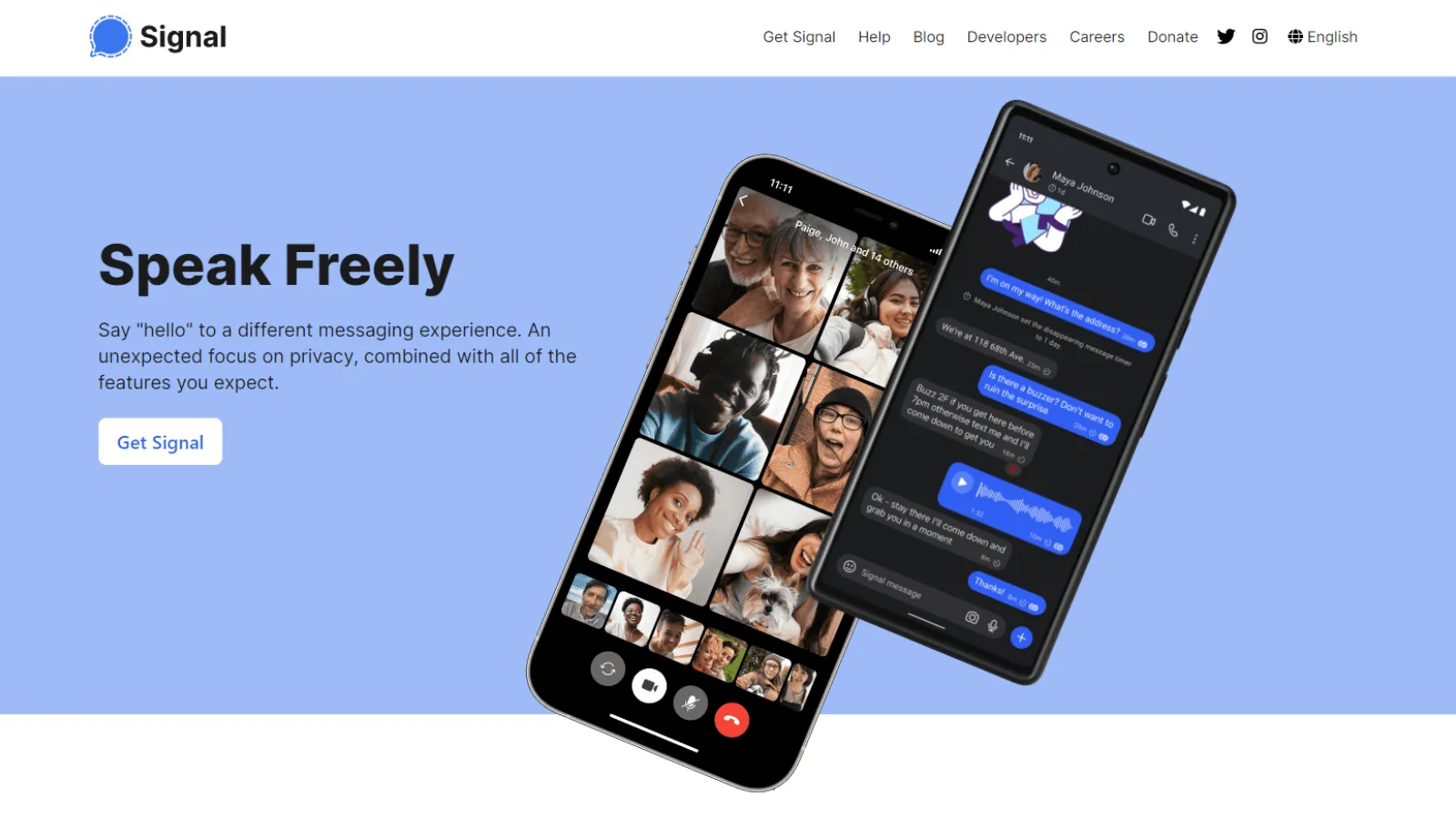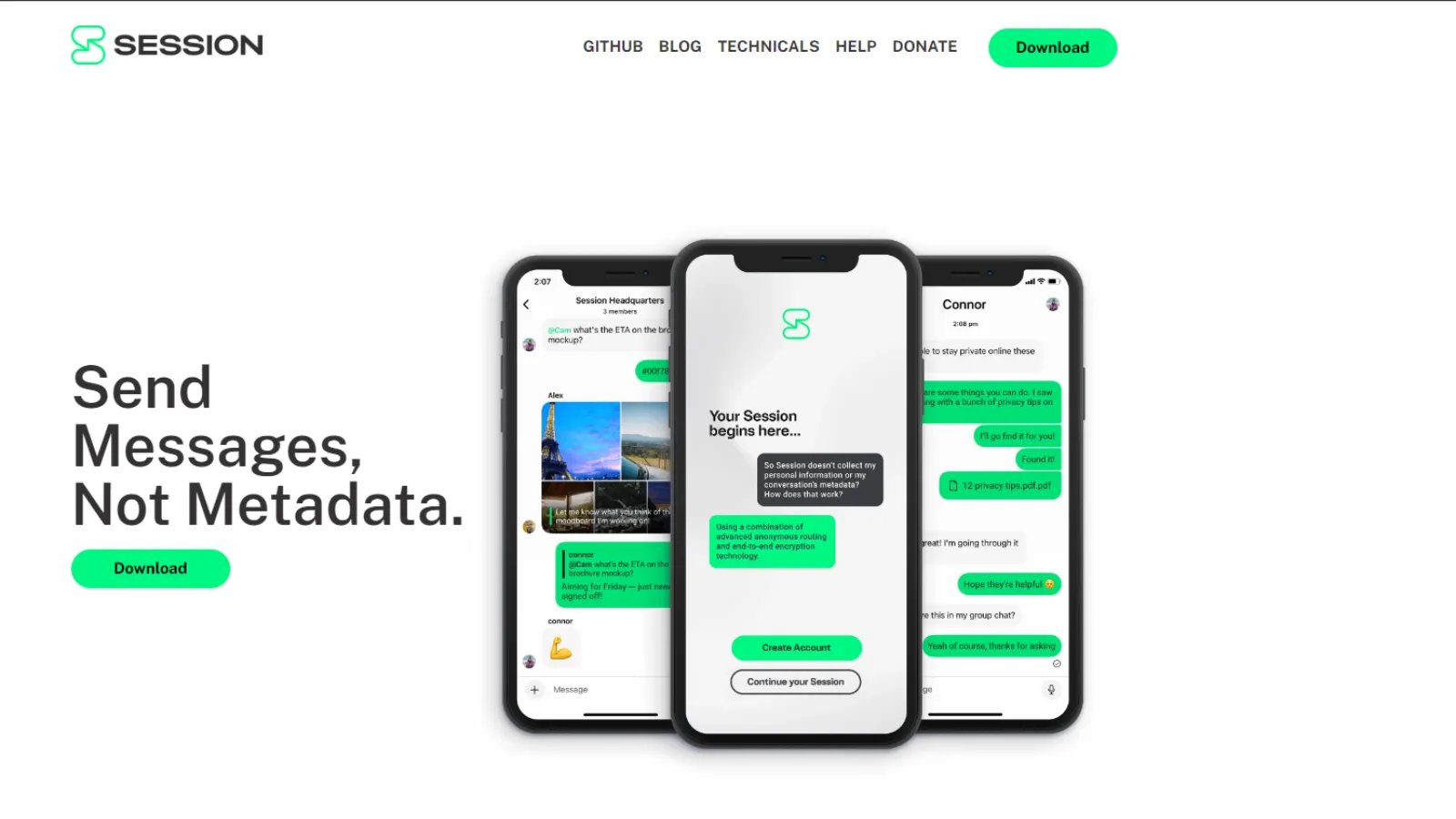Technology
Beyond Telegram: A Look at Alternative Private Messaging Apps
Published
3 months agoon
By
admin
The arrest and indictment of Telegram founder Pavel Durov by French authorities has led to renewed discussion about which messaging app provides the most privacy and protection for users. Despite its massive popularity, many critics say Telegram security is lacking.
Government interest in privacy-preserving technology is intense, as criminals have been known to use encrypted applications to conceal their crimes. However, such tools are also vital to journalists, dissidents, and survivors of abuse.
Let’s look at some of the top privacy-focused messaging applications for desktop computers, iOS, and Android. To come up with this list, we looked at apps that include end-to-end encryption, are open source and open to public scrutiny, allow for anonymity, and offer usability and solid features.
Signal
The top rival to the popular messenger app Telegram, Signal is a messaging application launched in June 2014 and offers private and encrypted messages and calls. Signal is available for both desktop and mobile devices.
Known for its strong privacy features, Signal offers end-to-end encryption for messages, calls, and video chats, ensuring that only the sender and receiver can read or hear them. Features include disappearing messages, encrypted group chats, and the ability to verify contacts outside of the app for added security.

Signal is open-source and doesn’t collect user data, making it a popular choice for privacy-conscious users. Signal is available for Android, iOS, macOS, Linux, and Windows.
Wire
Wire is an open-source messaging app launched in 2014. Aimed at business, law enforcement, and government agencies, Wire offers end-to-end encryption and collaboration tools. Wire supports text, voice, and video messaging, as well as file sharing and group chats. Features include timed messages, device synchronization, and encrypted video calls.

Wire is available on iOS, Android, Windows, macOS, and Linux.
Session
For users looking for a decentralized blockchain-based option, Session is an open-source private messaging app launched in 2020 by The Oxen Project based on the Signal protocol. It emphasizes privacy and security, with features like IP masking, end-to-end encryption, no phone number or email requirement, and routing messages. Its setup is similar to Tor, tapping the Loki network (Lokinet) to protect user identities.
Session also offers group chats, voice and video calls, and file sharing. It’s designed to minimize metadata collection, ensuring anonymity and secure communication for its users.

Sessions is available for Android, OS, macOS, and Windows.
Dust
Dust was originally launched in 2014 as CyberDust by billionaire investor and entrepreneur Mark Cuban along with Radical App. It is a secure messaging app focused on privacy. Available for both Android and iOS, Dust is not open-source. Still, it offers end-to-end encryption, messages automatically self-destruct, and users can also erase messages from both their device and the recipient’s device. Additionally, to enhance user privacy, Dust doesn’t store data on its servers.

Like Telegram and Signal, Dust features private group chats. Dust will also alert the user if someone screenshots a conversation.
While no messaging app should be considered 100% private, options like Signal, Wire, Sessions, and Dust are compelling tools for secure communication.
Generally Intelligent Newsletter
A weekly AI journey narrated by Gen, a generative AI model.
Source link
You may like


Cardano Price Hits $1 But Analyst Says This Is Just The Start


Legacy Media’s Transformation: Why Evolution Beats Extinction


Massive Ethereum Buying Spree – Taker Buy Volume hits $1.683B In One Hour


Ethereum lags behind Bitcoin but is expected to reach $14K, boosting RCOF to new high


Bitcoin Miner MARA Buys Another 5771 BTC As Price Nears $100k


Jason "Spaceboi" Lowery's Bitcoin "Thesis" Is Incoherent Gibberish
Technology
Know Your Missiles: Russia’s Experimental Hypersonic Missile Is A New Kind of Killing Machine
Published
1 day agoon
November 22, 2024By
admin

Whether it was a long-range Intercontinental Ballistic Missile, as originally feared, or an experimental intermediate-range hypersonic missile, as now believed, Russia’s war with Ukraine took yet another step toward fears of nuclear escalation on Wednesday.
The Russian missile strike on the Ukrainian city of Dnipro appeared to be in retaliation for missile attacks on Russia Tuesday after the Biden Administration authorized Ukraine to use long-range American-made Army Tactical Missile Systems (ATACMS) against targets inside Russia.
The hypersonic missile that was used is apparently the first of a new generation of weaponry being developed by superpowers across the globe.
Adding to the growing concern around Russia’s launch of its “Oreshnik” (the hazel) missile is the fact it carried a Multiple Independently Targetable Reentry Vehicle (MIRV) system that allows it to carry multiple warheads, a payload capacity typically associated with nuclear missiles.
Russian Channels are reporting that the recent Strike by the Ukrainian Air Force, using at least 10 “Storm Shadow” Air-Launched Cruise Missiles, against an Underground, Fortified-Command Center in the Kursk Region; resulted in the Death of 18 Russian Officers, including a Senior… pic.twitter.com/dHMhQ3bnkD
— OSINTdefender (@sentdefender) November 21, 2024
How Hypersonic Missiles Differ from ICBMs
What’s the difference between supersonic missiles and ICBMs? Their flight behavior, experts say.
While both ICBMs and hypersonic missiles achieve speeds in excess of Mach 5, hypersonic missiles are far more evasive and can fly inside the atmosphere, changing course at lower altitudes mid-flight to outmaneuver defenses.
In contrast, ICBMs follow a predictable parabolic trajectory after launch, making them far easier to track.
Russia’s use of a hypersonic missile underscores the broader race to develop hypersonic technology. Currently, the U.S., Russia, China, and North Korea have supposedly developed hypersonic missiles, though Russia appears to be the only country ever to launch one in combat.
On Monday, India became the latest nation to enter the arms race, announcing the successful test of what it claimed was its first hypersonic missile. However, whether the missile could be fitted with an effective payload, among other technical issues, was still an open question.
The @DRDO_India has successfully conducted a flight trial of its long range hypersonic missile on 16th Nov 2024 from Dr APJ Abdul Kalam Island, off-the-coast of Odisha.
Raksha Mantri Shri @rajnathsingh has congratulated DRDO, Armed Forces and the Industry for successful flight… pic.twitter.com/wq7yM2YS9f
— रक्षा मंत्री कार्यालय/ RMO India (@DefenceMinIndia) November 17, 2024
Though it has yet to deploy a hypersonic weapon, the U.S. is investing heavily in its research. The Pentagon’s 2025 budget includes a request for $6.9 billion for hypersonic weapons, according to an August 2024 report from the Congressional Research Service.
The Politics of Hypersonic Missiles
Russia’s use of a hypersonic missile is less about terror and destruction and more about sending a message to the West, according to former Intelligence Officer Matthew Shoemaker.
“This was more a message to President Biden, the U.K., and France, more so than to the Ukrainians,” Shoemaker told Decrypt. “It’s messaging to the West to stay out.”
Shoemaker, who served with the U.S. Defense Intelligence Agency and the U.S. Navy, suggested that if Russia had wanted to inflict serious damage on Dnipro, it could have used a conventional weapon.
“Putin could have achieved the same result in terms of taking out whatever target he launched against using a conventional weapon,” Shoemaker said. “He would have done it far more cheaply as well.”
Shoemaker also emphasized the timing of these exchanges, particularly given the political landscape in the U.S., suggesting that Biden’s authorization of ATACMS strikes may have been designed to give Ukraine leverage as President-elect Donald Trump prepares to take office.
“This is all very much political chess and political gamesmanship that both sides are playing,” Shoemaker said. “Apparently, from what I’m seeing, Biden allowed the attack just so that Ukraine could have some semblance of a bargaining chip when President Trump gets into office.”
Shoemaker clarified that while Russia’s missile is hypersonic, conventional Intercontinental Ballistic Missiles (ICBMs) are also considered hypersonic due to their power and speed—up to 17,600 miles per hour (Mach 25).
“If this were an ICBM type missile, the White House would have had to have been alerted beforehand by the Russians,” he said. “If the White House was not made aware that this was going on, it would have tripped our early warning systems, and it would have made people in the Pentagon go crazy that there was an unsanctioned ICBM launch.”
The alert Shoemaker referenced would be in accordance with standard procedures set in the International Code of Conduct against Ballistic Missile Proliferation, also known as the Hague Code of Conduct for ICBMs.
Earlier this month, before the U.S. tested a Minuteman III intercontinental ballistic missile, notifying the Russian government in advance of the launch.
While the Biden Administration has limited Ukraine’s use of ATACMS on Russian targets, Shoemaker observed since Russia’s 2022 invasion of Ukraine, President Vladimir Putin has repeatedly threatened nuclear war without taking action, relying instead on those threats as a deterrent.
“Putin has been using these nuclear weapons comments for the better part of three years now, and he’s not done anything with regard to it,” Shoemaker said. “So this is once again, him trying to send the message that I’m not bluffing, even though he’s bluffing.”
Edited by Sebastian Sinclair
Generally Intelligent Newsletter
A weekly AI journey narrated by Gen, a generative AI model.
Source link
AI
Decentralized AI Project Morpheus Goes Live on Mainnet
Published
4 days agoon
November 19, 2024By
admin

Morpheus went live on a public testnet, or simulated experimental environment, in July. The project promises personal AIs, also known as “smart agents,” that can empower individuals much like personal computers and search engines did in decades past. Among other tasks, agents can “execute smart contracts, connecting to users’ Web3 wallets, DApps, and smart contracts,” the team said.
Source link
Data
Web3’s responsibility is to advance data privacy
Published
6 days agoon
November 16, 2024By
admin

Disclosure: The views and opinions expressed here belong solely to the author and do not represent the views and opinions of crypto.news’ editorial.
In the United States, 92 per cent of individuals reported concern over their privacy while using the internet, highlighting how recent massive data breaches and narratives around Big Tech data monetization have eroded internet users’ trust. This has been especially heightened by the rise of opaque artificial intelligence systems and evolving sociopolitical landscapes.
Gaps in regulation
While the European Union’s General Data Protection Regulation in 2018 set a benchmark as the first comprehensive legal act aimed at enhancing internet users’ privacy rights, it is not without its shortcomings.
GDPR and subsequent regulatory frameworks have largely been ineffective at enforcing and holding Big Tech companies, particularly Google and Meta, accountable for collecting and selling user data. Claims surrounding potential GDPR violations have reportedly taken years, sometimes more than four, to be handled. The delays stem from complex procedures involving multiple agencies and countries handling complaints against specific companies, creating significant backlogs and weakening the act’s ability to enforce and uphold its mandate.
In the United States, the absence of federal legislation on data protection has led numerous states to take matters into their own hands. The US’s patchwork regulatory reality may create more harm than good, as variations on specific matters create endless compliance complexities for businesses operating across numerous states.
Users then receive varying degrees of data protection based on their location at any given time. Furthermore, for small- and medium-sized businesses, developing individual compliance programs for individual state regulators heightens costs that limit their ability to compete with Big Tech and other large corporations.
Meanwhile, Big Tech has been throwing its weight around with intense lobbying efforts, claiming any sort of legislation with real teeth to it will undermine innovation. While this is a discussion worth having, companies whose business model is highly dependent on data-based ad revenue don’t want increased consumer data protections.
Despite heightened awareness surrounding the value and vulnerability of personal data privacy, centralized entities, in the form of Big Tech conglomerates and governments, hold powerful sway over our user data. Regulatory protections are usually welcomed, but the lack of transparency between the intentions of Big Tech and governments won’t repair the distrust many have toward both.
Web3’s heightened role
This is precisely where web3’s decentralized infrastructure can bypass centralized entities, whose interests may not align with most users, to provide a higher standard of data protection.
Blockchain—and web3 more broadly—have had countless iterations and use cases of its technology designed to try and build wealth through games, crypto schemes, or other avenues. However, many projects and developers are either missing or choosing to ignore the potential they have in protecting user data.
Thanks to blockchain’s inherent encryption technology and immutable ledger, some web3-based privacy projects are staking their claim as an alternative to the current web2 system that dominates online interactions to profit from ad revenue. One such example is tomi, a DAO-governed project that leverages web3’s data-preserving strengths to create a decentralized, privacy-focused “alternative internet.”
tomi’s modus operandi is to champion security, data privacy, and freedom of speech throughout its operations and product offering. This includes offering services that advance its mission in material ways—including a VPN, storage, and private messaging service for its users to safeguard their browsing and communications by leaning into web3’s capacity for data privacy. Since the project is governed by a community and works on a unified model to keep the familiarity and UX of web2, tomi’s focus lies in making decentralized technology as intuitive and accessible as possible.
The reality is that as much as regular users would like to take more steps to preserve their data privacy, they’re unlikely to take these measures if there’s any inconvenience involved. This simple fact creates an obstacle that many web3 infrastructure projects don’t feel comfortable trying to overcome.
So, what is the takeaway here? For one, web3 projects must take themselves more seriously as champions of data privacy and protection within a cratered regulatory landscape worldwide. By stepping in with alternatives for those who are concerned about both Big Tech and regulatory overreach, developers have a strong and compelling use case that won’t fizzle out during a market downturn. However, preserving privacy cannot come at the expense of UX, and this must remain at the forefront if projects ever want a significant user base to transition to web3.
Source link

Cardano Price Hits $1 But Analyst Says This Is Just The Start

Legacy Media’s Transformation: Why Evolution Beats Extinction

Massive Ethereum Buying Spree – Taker Buy Volume hits $1.683B In One Hour

Ethereum lags behind Bitcoin but is expected to reach $14K, boosting RCOF to new high

Bitcoin Miner MARA Buys Another 5771 BTC As Price Nears $100k

Jason "Spaceboi" Lowery's Bitcoin "Thesis" Is Incoherent Gibberish

Bankrupt Crypto Exchange FTX Set To Begin Paying Creditors and Customers in Early 2025, Says CEO

Top crypto traders’ picks for explosive growth by 2025

3 Tokens Ready to 100x After XRP ETF Gets Approval

Gary Gensler’s Departure Is No Triumph For Bitcoin

Magic Eden Token Airdrop Date Set as Pre-Market Value Hits $562 Million

Blockchain Association urges Trump to prioritize crypto during first 100 days

Pi Network Coin Price Surges As Key Deadline Nears

How Viable Are BitVM Based Pegs?

UK Government to Draft a Regulatory Framework for Crypto, Stablecoins, Staking in Early 2025
182267361726451435

Top Crypto News Headlines of The Week

Why Did Trump Change His Mind on Bitcoin?

New U.S. president must bring clarity to crypto regulation, analyst says

Ethereum, Solana touch key levels as Bitcoin spikes

Will XRP Price Defend $0.5 Support If SEC Decides to Appeal?

Bitcoin Open-Source Development Takes The Stage In Nashville

Bitcoin 20% Surge In 3 Weeks Teases Record-Breaking Potential

Ethereum Crash A Buying Opportunity? This Whale Thinks So

Shiba Inu Price Slips 4% as 3500% Burn Rate Surge Fails to Halt Correction

‘Hamster Kombat’ Airdrop Delayed as Pre-Market Trading for Telegram Game Expands

Washington financial watchdog warns of scam involving fake crypto ‘professors’

Citigroup Executive Steps Down To Explore Crypto
Mostbet Güvenilir Mi – Casino Bonus 2024

Bitcoin flashes indicator that often precedes higher prices: CryptoQuant
Trending

 2 months ago
2 months ago182267361726451435

 24/7 Cryptocurrency News3 months ago
24/7 Cryptocurrency News3 months agoTop Crypto News Headlines of The Week

 Donald Trump4 months ago
Donald Trump4 months agoWhy Did Trump Change His Mind on Bitcoin?

 News3 months ago
News3 months agoNew U.S. president must bring clarity to crypto regulation, analyst says

 Bitcoin4 months ago
Bitcoin4 months agoEthereum, Solana touch key levels as Bitcoin spikes

 Price analysis3 months ago
Price analysis3 months agoWill XRP Price Defend $0.5 Support If SEC Decides to Appeal?

 Opinion4 months ago
Opinion4 months agoBitcoin Open-Source Development Takes The Stage In Nashville

 Bitcoin4 months ago
Bitcoin4 months agoBitcoin 20% Surge In 3 Weeks Teases Record-Breaking Potential




